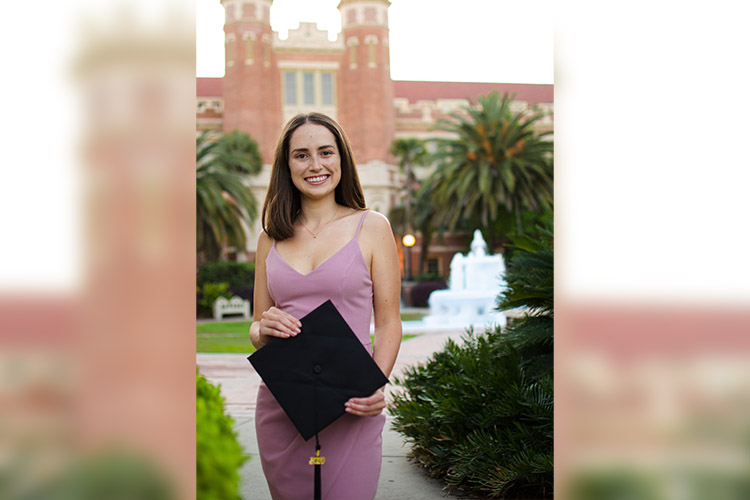Alumni Spotlight: Charlotte Puopolo

Charlotte Puopolo graduated in Spring 2020 with dual bachelor’s degrees from both the Department of Modern Languages and Linguistics, part of the College of Arts and Sciences, and the College of Social Sciences and Public Policy. Poupolo majored in Spanish and international affairs, with minors in French and law and philosophy.
Where are you from and when did you graduate?
I am from Jacksonville, Fla., and I graduated from FSU in May 2020.
What brought you to FSU?
I chose to attend FSU because of its supportive Honors Program and its proximity to the Capitol. The Honors Program allowed me to live on campus in Landis Hall during my freshman year and funded part of my Summer 2018 studies in Costa Rica as part of the FSU Spanish Immersion program. FSU’s location in Florida’s capitol enabled me to intern part-time in the Florida House of Representatives and attend one of the governor’s Executive Clemency Board Meetings during my classes.
What are your favorite experiences at FSU?
Participating in the Service Leadership Seminar, a weeklong event put on by the Center for Leadership and Social Change for incoming freshmen, opened my eyes to the many ways to get involved on campus and how to meaningfully talk about identity. It was a defining moment when I realized the depth of my privilege as a cisgender white woman and how the system does not work equitably for everyone.
What inspired you to pursue your various majors and minors?
I majored in international affairs because I’m drawn to international politics and policymaking. I also declared a minor in law and philosophy, which allowed me to study ethical theory and human rights. My various internships inspired me to pursue these fields. At the Capitol, I interned with the legislative aide of state representative Dotie Joseph in 2019 and did research and bill analysis. My internship at the FSU Center for the Advancement of Human Rights showed me what it looks like to advocate for human rights in your town. It means helping people navigate the immigration system, finding legal help for survivors of abuse, and supporting victims of police brutality. I chose to major in Spanish and minor in French because I like being challenged to think critically about culture, linguistics and literature. I wanted to follow this path after taking professor Delia Poey’s Hispanic cultural analysis course as a freshman.
What aspect of your area of study do you find most fascinating?
I love thinking about language as a window to see the world. Our individual and socially-constructed lexicons frame how we perceive the world around us, so learning a new language is like learning a new way to think.
My international affairs degree let me explore my interests in public policy and human rights. I enjoyed studying international affairs within the framework of many different disciplines, including world history, comparative politics, philosophy and public administration. Our generation needs people who challenge systems of oppression and think about current issues in terms of human rights abuse. These courses lay the foundation to do just that.
Can you tell us about your upcoming position as a Fulbright English teaching assistant in the Canary Islands?
I applied for Fulbright because I love the idea of immersing myself in another culture and community. After studying abroad in Costa Rica, I knew I wanted to relocate to a Spanish-speaking country. I was fascinated by the idea of the Canary Islands as a physical, cultural and linguistical crossroads. I will be teaching English in an elementary school and am beyond excited to be a cultural and language ambassador on behalf of the U.S. In my spare time, I also plan to volunteer with a refugee resettlement non-governmental organization to better understand and serve the community. I hope to finish my Fulbright grant with a greater understanding of cross-cultural communication and put human rights policy into practice.
Are there any faculty or staff who have helped and/or inspired you?
I am deeply thankful to associate professor of Spanish José Gomariz and teaching professor Anel Brandl for helping me throughout the Fulbright process. In addition to letters of recommendation and moral support, Gomariz was instrumental in encouraging me to move abroad after graduation, and Brandl taught an incredibly valuable course on bilingualism. I am also immensely thankful to the Office of National Fellowships for helping me make my Fulbright application worth reading, let alone grant-worthy.
After graduating, what are your plans?
Because of COVID, Fulbright delayed the start date from August to January 2021. I’m looking forward to living in the Canary Islands, using Spanish in my daily life, and experiencing something completely new. Post-Fulbright, I plan on pursuing a graduate degree that combines human rights and public policy equipped with a working knowledge of the Spanish language. In the meantime, my post-college plans are living at home with my family, working, and doing a lot of reading.
What advice do you have for fellow students?
Live every semester like it’s your last one. Go to different club meetings to find one you like, take a class outside your major, join an intramural team. It’s all worth it.
Also, if you see greatness in something, don’t be afraid to hold it accountable. I loved my time at FSU, and I know it can do better. I sincerely hope the university’s anti-racism task force and its removal of the Francis Eppes statue are more than performative gestures. My advice: Listen to Black student leaders. Demand more action than a placating promise to diversity. Speak up about injustice and hold FSU accountable to the interests of all its students. It is all of our responsibility to help dismantle the culture of white supremacy around us.

